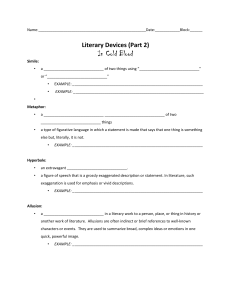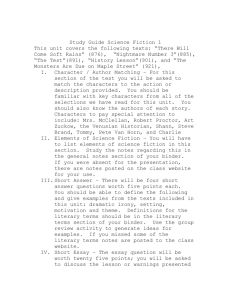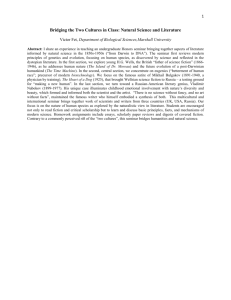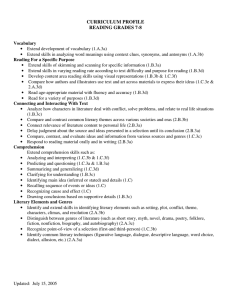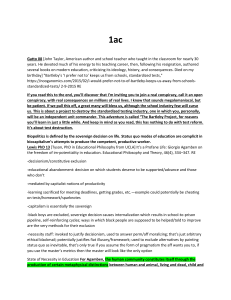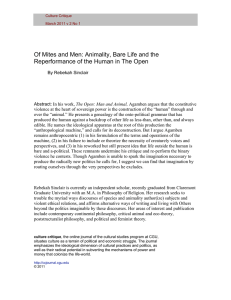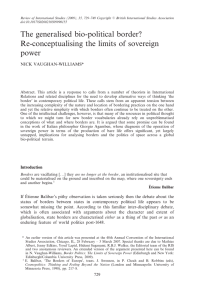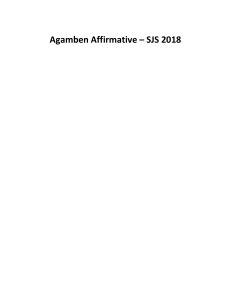Graduate Course Offerings FALL 2016
advertisement
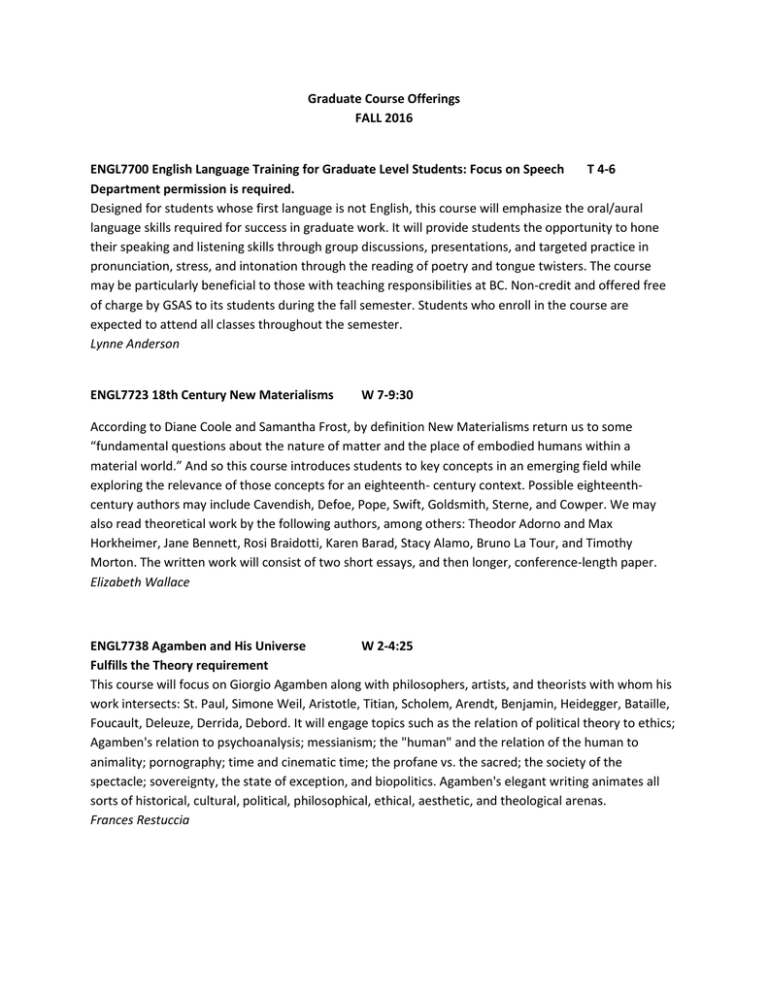
Graduate Course Offerings FALL 2016 ENGL7700 English Language Training for Graduate Level Students: Focus on Speech T 4-6 Department permission is required. Designed for students whose first language is not English, this course will emphasize the oral/aural language skills required for success in graduate work. It will provide students the opportunity to hone their speaking and listening skills through group discussions, presentations, and targeted practice in pronunciation, stress, and intonation through the reading of poetry and tongue twisters. The course may be particularly beneficial to those with teaching responsibilities at BC. Non-credit and offered free of charge by GSAS to its students during the fall semester. Students who enroll in the course are expected to attend all classes throughout the semester. Lynne Anderson ENGL7723 18th Century New Materialisms W 7-9:30 According to Diane Coole and Samantha Frost, by definition New Materialisms return us to some “fundamental questions about the nature of matter and the place of embodied humans within a material world.” And so this course introduces students to key concepts in an emerging field while exploring the relevance of those concepts for an eighteenth- century context. Possible eighteenthcentury authors may include Cavendish, Defoe, Pope, Swift, Goldsmith, Sterne, and Cowper. We may also read theoretical work by the following authors, among others: Theodor Adorno and Max Horkheimer, Jane Bennett, Rosi Braidotti, Karen Barad, Stacy Alamo, Bruno La Tour, and Timothy Morton. The written work will consist of two short essays, and then longer, conference-length paper. Elizabeth Wallace ENGL7738 Agamben and His Universe W 2-4:25 Fulfills the Theory requirement This course will focus on Giorgio Agamben along with philosophers, artists, and theorists with whom his work intersects: St. Paul, Simone Weil, Aristotle, Titian, Scholem, Arendt, Benjamin, Heidegger, Bataille, Foucault, Deleuze, Derrida, Debord. It will engage topics such as the relation of political theory to ethics; Agamben's relation to psychoanalysis; messianism; the "human" and the relation of the human to animality; pornography; time and cinematic time; the profane vs. the sacred; the society of the spectacle; sovereignty, the state of exception, and biopolitics. Agamben's elegant writing animates all sorts of historical, cultural, political, philosophical, ethical, aesthetic, and theological arenas. Frances Restuccia ENGL7764 Twentieth-Century Irish Fiction T 2-4:25 In this graduate seminar, we will read a selection of Irish novels so as to identify, discuss and better understand complex cultural phenomena that become manifest in the aftermath of the colonial experience. The underlying premise suggests that Irish novelists participate in debates concerning national identity and, in the process, anticipate the evolution of a postnational society. Paying particular attention to issues of language, gender, place and literary authority, and to representations of religion, history, and identity, the seminar seeks to establish the inevitable heterogeneity related to the postcolonial condition. James Smith ENGL7765 What Is Performance? TH 4:30-6:55 Fulfills the MA theory requirement This course, which satisfies the M.A. theory requirement, maps the emerging field of performance studies, which fuses theater studies, anthropology, ethnography, and feminist and poststructuralist theory. We will test the utility of the field's primary concepts, especially "the performative," for the analysis of specific cultural performances, ranging from scripted plays to rites of passage to 1970s glam rock to performance art (including one local event chosen by the class). Work will include biweekly responses; a presentation; a short paper; and a final paper analyzing a theatrical or cultural performance of students' own choosing Andrew Sofer ENGL7784 Studies in Early Modern Poetry F 2-4:30 This course promotes broad and deep familiarity with poems by Shakespeare, Donne, Herbert, and Marvell. It will afford some attention to the transition from manuscript circulation to print and from print to digital publication: the access that we have to Shakespeare’s sonnets uniquely through print; some implications of Donne’s eschewing print for his poems and yet preparing his sermons to be printed; the making of Herbert’s manuscript into a book by the Little Gidding community; the erratic history of disseminating Marvell’s lyrics. The phase of the course given to Donne will explore emerging digital resources that are creating unprecedented opportunities for readers and for scholars. Dayton Haskin ENGL8840 Contemporary American Fiction TH 2-4:25 This seminar examines works of fiction published within the past two decades with a special focus on the novel. It considers how postmodernism largely fails to describe these works and how in working in the form of the novel authors struggle to maintain its cultural prestige in the face of multiple challenges. It also considers the growing diversity of authors and works who are gaining the most attention, as well as an increasingly lively interest in popular genres once eschewed by high literary aspirants. Readings are a mix of fiction and criticism. Min Song EN8887 Introduction to Advanced Research M 2-4:25 This course will acquaint you with the essential resources to carry out the central tasks of literary scholarship. Bibliography (broadly defined as the investigation of the production, dissemination, collection, location, and identification of literary artifacts) is indispensable to scholarship and criticism of all kinds, just as a critical sensibility guides our choice of what books to look for. You will be guided through the reference works and databases available in the Boston College library and others, discuss the goals, purposes, and future of the field of literary studies, and produce an original project based on archival sources. James Najarian ENGL9907 PhD Seminar: Global Economy, Ecology, and the Novel T 10-1 In our current global situation the economy and the market dominate the political sphere and direct the intimacies of social life, while fundamentally transforming the planetary environment. We shall approach this situation by a) tracing its genealogy in the industrial revolution through 19th century literature; b) engaging with economic theorists to grasp the contours of economic logics; and c) studying the impact of the global economy on the environment through world literature. The aim of this course is to draw a wide arc that will connect the economy to the environment and to the proliferation of civil conflict and inequality. Kalpana Seshadri ENGL9936 Pulp, Popular, Proletarian M 4:30-6:55 This is a course on the underground worlds of American writing that often remain out of view in the academy. Working from contemporary cultural studies, we will focus on three different forms of nineteenth and twentieth century American prose: working class narrative (for instance, proletarian fiction or memoir from the 1930s) "pulp" or sensational literatures (dime novels, or nonfiction exposés of poverty, prisons, or crime); and popular romance genres (adventure, mystery, "true confessions"). Readings will include not only samples of these particular genres, but attempts by well-known American writers to adapt them to elite practices and experimental styles. Christopher Wilson
